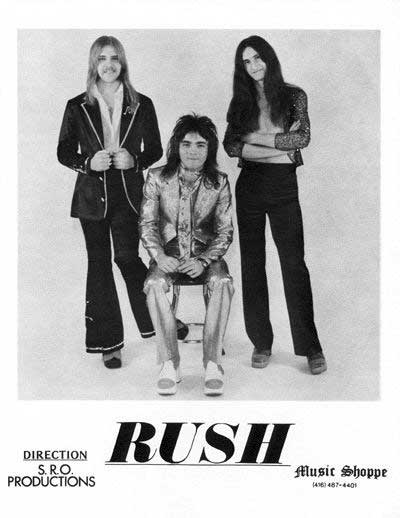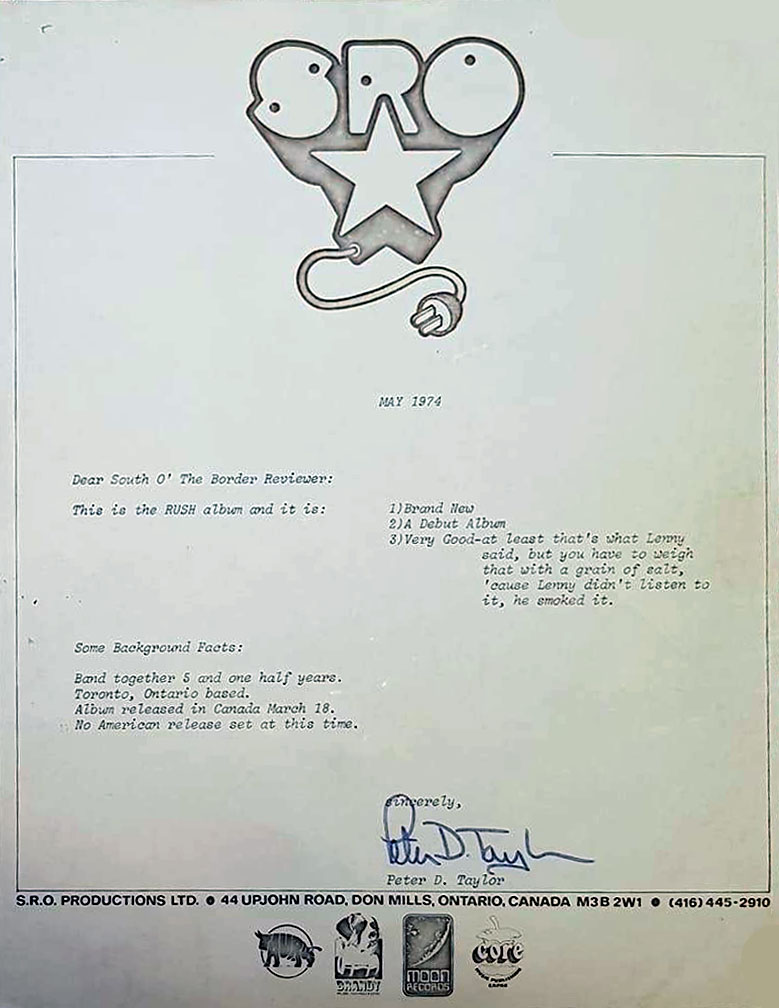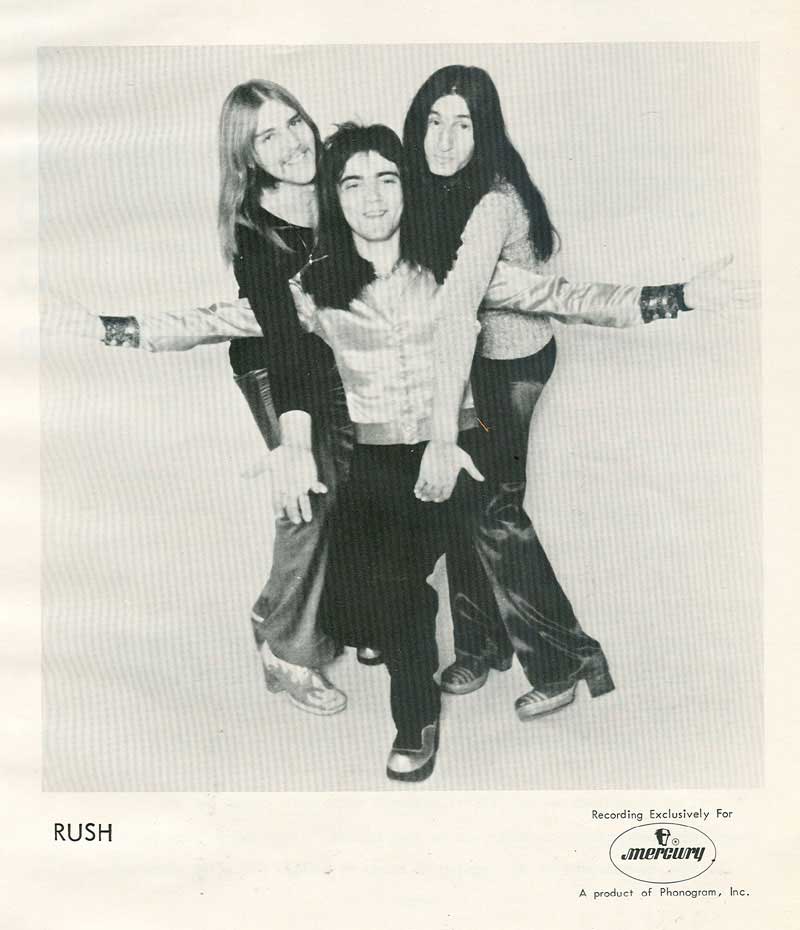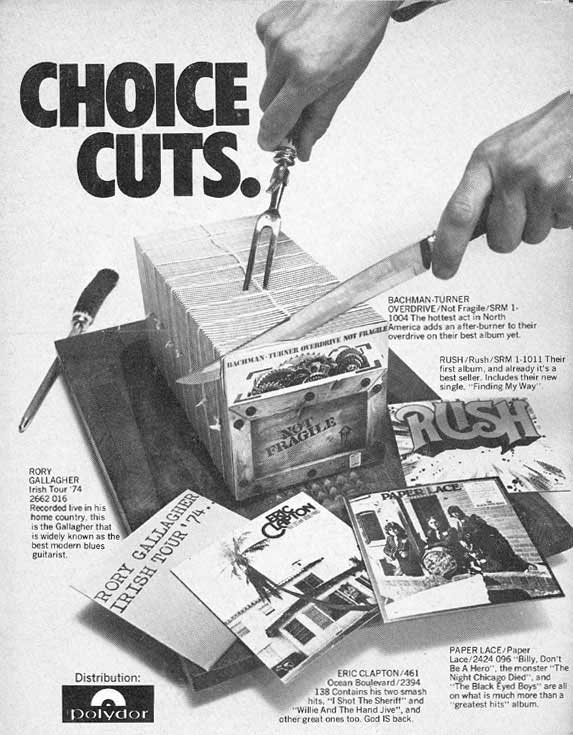
- Finding My Way (5:06)
- Need Some Love (2:19)
- Take A Friend (4:24)
- Here Again (7:35)
- What You're Doing (4:22)
- In The Mood (3:34)
- Before and After (5:34)
- Working Man (7:10)
Geddy Lee - Lead Vocals & Bass
Alex Lifeson - Guitars & Vocals
John Rutsey - Drums & Vocals
Road Crew - Ian Grandy & Liam Birt
All music published by Core Music Publishing (SOCAN)
All songs composed by Lee & Lifeson except 'In The Mood' composed by Lee
Tracks 1, 2, 4, 5, 6, 7 recorded at Toronto Sound Studios
Tracks 3, 5, 6, 7 recorded at Eastern Sound
Remixed at Toronto Sound
Remix Engineer-Terry Brown
Mastered at Masterdisk
Produced by RUSH
Executive Production-SRO
Executive Producer-Robin McBride
Photographs by BIC Photography
All arrangements by RUSH
Album cover design by Paul Weldon
For best results play at maximum volume.
[Moon Records Release] Special thanks to: Abbey Road Pub and Staff, Doc Cooper, Mr. & Mrs. G. Grandy, Cousin Glenn McLaren, Hal Greeson, Kalua Music, Drew Metcalf, Music Shoppe International, Sheila Posner, R.P.M., Peter Taylor, Paul Weldon
[Mercury Records Release] Special thanks to-Denny Rosencrantz/Cliff Burnstein/Charlie Fach
Of course not to forget all those who have made this possible. Jeff Franklin - Ira Blacker - Sol Saffian - Greg McCutcheon - Wally Meyrowitz - Marsha Weiss - Joe McHugh - Lezlee Monchak - Bob Roper - Peter Taylor - Glenn McLaren - Thanks to Mike & Jules Belkin for their early belief.
With Special Thanks to Donna Halper of WMMS in Cleveland for getting the ball rolling
A Moon Production Inc/Personal Direction: Ray Daniels & Vic Wilson of S.R.O. Productions, Toronto, Canada.
© 1974 Mercury Records © 1974 Anthem Entertainment
Notes


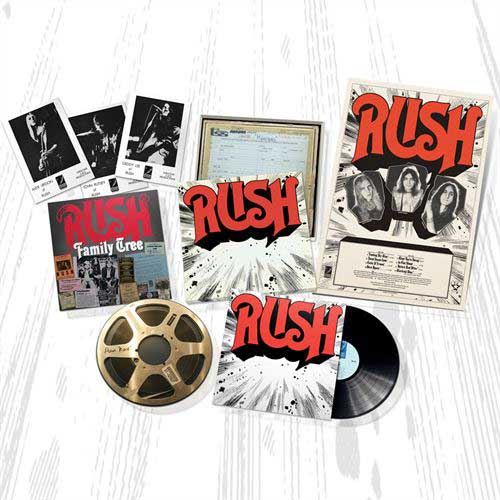
- Released March 18, 1974, by Moon Records (with the original red logo), Rush entered Canada's RPM Top Album's chart at #100 the week of March 31 - April 6, 1974.
- Released August 10, 1974, by Mercury/Polygram (with the revised pink logo), as determined by the All The World's A Stage press kit from Mercury Records, which reads "It was four days after release of the debut album, Rush, that the group started its first US trek." The first show of the US tour was August 14th, 1974.
- Certified Gold by RIAA: February 1, 1995 - Highest Billboard Chart Position: 105
- A 2:35 edited version of "In The Mood" was released on the 1975 K-Tel compilation Canada Gold 22 Karat Hits; 41 seconds were removed by cutting the guitar solo.
- A live version of "Before And After" was finally released on R40 as part of the Laura Secord show bonus feature.
- Originally released for the Rock Band video game on July 8th, 2008, on July 22nd Rush released the "Working Man (Vault Edition)" as a digital download. The track would later be included on Rush 50.
- Reissued April 29, 2014 by Universal Music Enterprises (UMe) on vinyl as Rush reDISCovered, part of Universal's reDISCovered vinyl series. "Housed in a sturdy, custom box with a lift-off top, this landmark album is pressed on 200g, audiophile grade vinyl, from the original 1974 analog stereo masters, cut to copper plates using the Direct Metal Mastering (DMM) process at the legendary Abbey Road Studios. Rush also features the original Moon Records jacket art, complete with the original MN-100-A/B Matrix etching, and will include a 16"x22" reproduction of the first Rush promo poster, three 5"x7" lithographs of Geddy Lee, Alex Lifeson and John Rutsey, a 12"x12" Rush Family Tree poster, and a digital download card for a free digital copy of this newly remastered release." - Rush Rediscovered LP Box Set Press Release
"This version features a never before heard guitar solo that Alex Lifeson did during the original recordings back in the 70's. The song was re-mixed by Rich Chycki who is known for his work on R30 and Snakes & Arrows. A great addition to the Rush song library!" - Rush.com, July 21, 2008
In Their Own Words
"Most of the material on the first album had existed for five years-the band had played it around bars and high schools in Ontario." - Neil Peart, Circus Magazine, November 25, 1976
"If their first album, set to be released sometime this month on the Moon label, is a success, they will really be on their way. The album, which contains only original material, was first recorded last April at Eastern Sound. They weren't quite satisfied with this version, so they went to Toronto Sound and redid the album. It was then planned to be released at the first of December, but because of the vinyl shortage, and other typical hassles in the record industry, it was held up." - Eye, March 21, 1974
"Part of the album was recorded at Eastern Sound in early 1973 and in November of the same year they went over to Toronto Sound to re-record some of it and totally remix it." - Billboard, November 9, 1974
"We'd start playing at nine and finish at one in the morning; we played three or four sets a night. Afterwards, we'd take all our gear out of the bar and move it into an 8-track studio. We'd set up and then record from 2:30 to 8:00 in the morning. In addition, the producer didn't know what he was doing. It was just crazy...After we finally heard the original mixes, we went, 'Wow! There's something wrong with this. It doesn't sound good.' You know, it sounded really dinky and wimpy. And we were disappopinted. So we figured that the guy in charge of the production just didn't know what he was doing. He was a good engineer, I guess, but he was no producer. Se we were freaked out, and our managers were freaked out because we'd spent all this money and it didn't sound right. So one of our managers knew an engineer/producer named Terry Brown who'd come over from England; he had his own studio in Toronto. We took the takes to him, and after listening to them he couldn't believe how poorly recorded the stuff was. So we made a deal that we'd work 48 hours straight in this studio in an effort to fix up the tapes-that's all the money we could afford. So in that 48 hours, we redid three songs from top to bottom, and fixed up all the other tracks as best we could, and then remixed them. It made quite a difference-it's still a real raw-sounding album, but at least it has some balls to it." - Geddy Lee, Guitar Player, June 1980


The week ending August 22, 1973, Rush released their debut single "Not Fade Away", a cover of the Buddy Holly original, backed by the Rush original "You Can't Fight It". It debuted at #99 on the Canadian Top 100 singles chart the week of September 29, 1973, eventually reaching Number 88 the week of October 13, 1973, before apparently dropping out of the Top 100 the following week.
"The newly formed Moon label has released its first single through London 'Not Fade Away' by Rush." - Billboard, September 15, 1973
As explained by Geddy, after reviewing the initial recordings made for the album, three songs were re-recorded with Terry Brown. Although it is unclear, it appears that those three songs replaced three previously recorded songs, two of them being the songs originally recorded for the debut single:
"'Not Fade Away', not too many people have that. That was honestly a very limited run of records, and that particular record was done with the original producer, David Stock, who produced the first album in about two hours and it sounded like it was maybe done in two or three minutes. We just did a version of it that sounded good! It was real powerful, nothing like the Rolling Stones version or the original version. It was a lot more powerful. It was a lot of fun to play! And playing the bars, it was a song that always went over really well. We use to close with it or we close a set with it." - Alex Lifeson, "A Total Access Pass To Rush", The Source, NBC's Young Adult Network, June 8, 1984
[Why was it that for Rush's first single, recorded in 1973, you chose a rock'n'roll standard, Buddy Holly's Not Fade Away, and not one of your own pieces?] "I don't remember, it was so long ago... I suppose that our manager figured that we should play something that people would recognize and not one of our weird songs. You know, at the time we were trying to survive by playing in bars, and in these bars, no one wanted to hear our music. They only wanted hits they recognized. Our compositions were probably too strange for them." - Tylko Rock, November 1996
"Geddy and John Rutsey wrote ['You Can't Fight It']...It was also supposed to be on our first album, but we dropped it, too. I think we took off three or four songs that were going to be on the album. 'You Can't Fight It' was a fun tune to play, though, especially in the bars late at night. We would never play it early in our show; we'd always do it in the second set or the last set when everybody was feeling pretty spirited, in both senses of the word. [laughs] As to why we picked this song over some of our other originals, I think the reason was because it was short. You had to be under three minutes to get on the radio in 1973, and 'You Can't Fight It' fit. Like 'Not Fade Away', I thought this recording was a little tame. I thought so then, and I've always thought so. But it's what we did at the time." - Alex Lifeson, Musicradar.com, October 24, 2011
"'Finding My Way', 'Need Some Love' and, I think, 'Here Again' were the songs that we rerecorded for the record. So we dropped 'Not Fade Away', 'Can't Fight It', and there may have been another one*...'In The Mood' was probably at least two years old, if not three, when we recorded the first record." - Geddy Lee, Contents Under Pressure
*The third song Geddy mentioned as being dropped from the original tracklist was likely "Fancy Dancer", another Rush original performed in the early '70's which during a performance on November 19, 1974, was introduced as "one that will probably be on our next album". Another pre-Peart original from the early days, "Garden Road", was last performed less than a month after Neil joined the band (before being resurrected in 2015 on the R40 Tour). When asked why "Fancy Dancer" and "Garden Road" were never officially released, Neil replied:
"... two original songs written before I joined the band... Well, why do you think we never recorded them?" - "Rush Backstage Club Newsletter" 1988
Terry Brown remembers the three re-recorded songs as being different from those that Geddy recalls:
"I first got involved with Rush when they were doing their first album [1974's Rush]. They'd recorded a bunch of eight-tracks on the graveyard shift in a studio in Toronto, but they didn't know what to do with them or how to mix it. They called me up; we added three new tunes, What You're Doing, Before And After and Working Man, and mixed the album in three days. We had such a good time they asked me to get involved on a long-term basis." - Terry Broon, Classic Rock Special Edition, June 11, 2012
Geddy discussed the original recordings in his book My Effin' Life:
"On the third night, while we did our gig at the Gasworks, David [Stock, producer] mixed the entire record. An entire album in two hours? After the show we sat down in the studio to listen, and our hearts sank. (Talking about it recently, Alex and I both uttered the same word at once: 'crestfallen.') Song after song, the sound was dinky: the drums lacked power, the vocals sounded thin and the vocal echo effects were wrong, wrong, wrong. And cheesy, especially on 'Not Fade Away.' David either didn't get it or, to be more charitable, had been unable to capture our sound in the time allowed. Whichever it was, we did not sound heavy in any way, shape or form. Even today it's painful for me to listen to 'You Can't Fight It.' Even to say it sounds cool as a relic is a generous description. It takes me right back to the disappointment I felt in that studio the night it was first mixed. I was thinking, What is this? We've been neutered! Since the late sixties, playing high school dances, then the bars and now the occasional small arena, we'd become so accustomed to how big our live sound felt onstage that when we heard that first playback, it was shocking how starkly it missed the elements that gave us power and size. It didn't sound like us at all. Fuming, we went to Ray and Vic. They promised to find someone to rescue the album, but insisted on putting out two single sides to help promote our gigs. What could we say? We didn't feel we had much choice in the matter... In September '73, Moon Records released David's mixes of 'Not Fade Away' b/w 'You Can't Fight It.' Around five hundred copies of that lousy production were pressed, and it remains our weak first record. There was no way we would stand for a full album to be released sounding like that, not with our name on it, but as we pondered what to do with the remainder of the sad thing, we were now at least a bona fide recording act—'Moon Recording Artists, Rush,' the press releases said—and we had gigs to play….A few weeks later Vic suggested we meet with an expat British engineer/producer friend of his named Terry Brown, who owned and operated a studio called Toronto Sound in the eastern end of the suburbs. He didn't seem very interested at the start, but agreed to try to save the day. He listened to the record and said he understood the problems: the drum sound was feeble (out of phase, in fact), the guitars lacked weight, things that should have sounded big sounded small. By then we'd written some new songs, 'Finding My Way,' 'Need Some Love' and 'Here Again' (for which Alex wrote the lyrics), and after Terry came to a bar gig to hear us play live, he recommended we substitute them for a couple of the old ones. So we said bye-bye to 'Not Fade Away' and 'You Can't Fight It,' and they remain the only orphaned songs from those sessions." - Geddy Lee, My Effin' Life
Although Rush had been performing many of these songs for years on the bar circuit, apparently many of the lyrics were never finalized until the recording of the album.
"The funny thing is, John was the lyricist in the band at the time, and he wouldn't submit the lyrics for any of these songs. So Geddy had to quickly put some lyrics together for it. I wrote the lyrics to 'Here Again,' but everything else was just sort of thrown together. And I think John probably regrets that, you know, to this day." - Alex Lifeson Contents Under Pressure
"I was going through a real struggle at this time with the band. I said to myself, 'I feel like quitting.' I was just a mixed-up kid and I began writing all sorts of additional lyrics for the songs, because most of the lyrics we had at the time were just whatever rhymed, whatever fitted in, 'cause we never really spent much time at all on the lyrics. So then finally we said, 'We've got to get some decent lyrics. This is silly, just saying whatever pops into your head and then trying to remember it the next night.' So we made a conscious effort and I started writing some lyrics. I was really having a hard time with myself and what I wanted to do with the band. I was very mixed up, I'd written a lot of lyrics and then I tore them up and never presented them. So when we went in and did the album all the old lyrics were sung. It's funny, because to this day I still can't remember why I did that. All I can attribute that to was that, at the time, I was just very confused about what I wanted to do. I really regret it because it was an incredibly selfish, stupid thing to do. But when you are young, unfortunately you do things like that. My mood would change from day to day, I had spent a lot of time on them and some of them were decent." - John Rutsey, Visions
In 2009 Alex Lifeson discussed the possible existence and future release of some pre-1974 recodings which he had discovered in his archives:
"I was up at my studio I'm upgrading and changing my control room around a little bit. Rich [Chycki] and I have sort of 'moved in together' in there. And I was cleaning up the back room...and I just found a case that was way up on the top shelf, and at the bottom of this box were a bunch of reel-to-reel, unlisted, unmarked, recordings - and I can only imagine that they're pre-'74. So, they would probably be from between '70 and '73...recordings from that period. So, they would probably have songs like 'Run Willie Run,' and 'Slaughterhouse,' and 'Garden Road,' and all of those early songs that we wrote and played during our bar days...I'll see what sort of shape they're in. I know a couple of the reels were...you know those small reels, and I've got to think that even spooling them might be a problem, never mind me playing them. Anyway, I just discovered them, so who knows? There may be something in the near future." - Alex Lifeson - Guitar International, January 23, 2009
 John Rutsey passed away peacefully in his sleep on May 11, 2008, from a heart attack due to complications from his lifelong affliction with type-1 diabetes.
John Rutsey passed away peacefully in his sleep on May 11, 2008, from a heart attack due to complications from his lifelong affliction with type-1 diabetes.
"RUTSEY, John Howard - It is with deep sadness that John's family announces his untimely passing due to complications from his lifelong affliction with diabetes, at age 55. Donations may be made in John's memory to the Juvenile Diabetes Research Foundation, 7100 Woodbine Avenue, Suite 311, Markham, ON, L3R 5J2 (online: www.jdrf.ca, by phone: 905-944-4631). Online Condolences: newbiggingfh@rogers.com. Published in the National Post on 5/15/2008."
"Our memories of the early years of Rush when John was in the band are very fond to us. Those years spent in our teens dreaming of one day doing what we continue to do decades later are special. Although our paths diverged many years ago, we smile today, thinking back on those exciting times and remembering John's wonderful sense of humour and impeccable timing. He will be deeply missed by all he touched." - Alex & Geddy, Rush.com, May 16, 2008
"I'm very glad that the documentary qualified once and for all that, no, [original drummer] John Rutsey was not a drug addict. He didn't have to leave the band because of heroin or all of these horrible things that were being said about the guy. He had severe diabetes. Which today, you can test yourself in the morning. You can administer your own shot of insulin. But in 1974, not so much. You had to go to a hospital. And if you were in a rock band and you had to stop down every four hours while your guy went to the hospital-it just wasn't working out. Whether you're a little band in Toronto-yeah sure, they'll wait around four hours while John goes and gets tested. But in the real world, they were kids. They had something on their mind. They wanted to plan. They wanted to dream. And when they got older, they needed the flexibility to be able to travel. And John couldn't do it. And I know how bitter he became. I know how sad he was. Not bitter at the guys; he understood what happened. But bitter at the hand he was dealt. And I think years later he would have been dealt an entirely different hand. There are diabetic musicians who are out there, and are very successful. But back then, he was kind of born too soon.." - Donna Halper, TheClevelandSound.com, April 6, 2011
Promos
Smartphone Wallpaper
Our RUSH smartphone wallpapers have been modified for a 9:19.5 aspect ratio to fit "most" Smartphones.

This is a collection of transcripts of magazine and newspaper articles and other media related to this release or coinciding with the time frame surrounding it. This is an ongoing work in progress; feel free to email any suggested additions.
